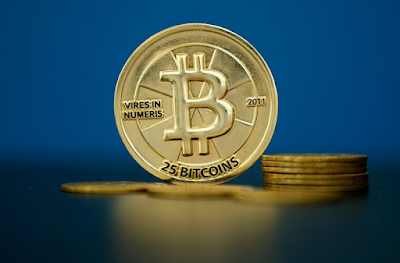 |
| Bitcoin (virtual currency) coins are seen in an illustration picture taken at La Maison du Bitcoin in Paris (Photo: Reuters) |
The NHS has been hit by a major cyber attack today, with hackers demanding $300 in 'bitcoin' to unlock private patient files.
The attack has crippled trusts across the UK , with 16 authorities reporting their hospitals' computers being locked up by some form of computer virus.
But what is Bitcoin?
Here we look at the 21st century currency that exists only in cyberspace.
Bitcoin was the first of what have become known as "cryptocurencies".
These are forms of digital money that use encryption to secure transactions and control the creation of new units.
The popularity of Bitcoin has spawned many copycats - sometimes called "altcoins".
To make things more confusing, there are also "second generation" virtual currencies like Ethereum, which has been in the news recently following the hack of the Distributed Autonomous Organisation (DAO) investment platform.
Where did Bitcoin come from?
Created by a mysterious developer who uses the pseudonym Satoshi Nakamoto, Bitcoins exploded on to the financial scene in 2013, following enormous increases in their value.
In the original Bitcoin white paper, Nakamoto describes his creation as a "peer-to-peer version of electronic cash", allowing "online payments to be sent directly from one party to another without going through a financial institution".
How does Bitcoin work?
Nakamoto wrote that such a currency uses "cryptographic proof instead of trust, allowing any two willing parties to transact directly with each other without the need for a trusted third party".
This sort of stateless, bank-free currency uses a distributed, cryptographically secure "blockchain" to record payment transactions.
Recording of payments onto the blockchain is powered by users, who offer their computer power.
They are rewarded with newly created Bitcoins, and this activity is referred to as mining.
The future of cryptocurrencies
Second-generation cryptocurrencies include altcoins with more advanced functions, that harness the computing power of the blockchain.
An example is Ethereum - the blockchain can execute "smart contracts".
These are pieces of computer code that can interact with other coded contracts and perform work - for instance moving money around and making decisions.
The DAO platform that was hacked is written into the Ethereum blockchain and can autonomously operate without humans to control the organisation.
To decide what investments the DAO makes, its members vote on which proposed contacts will be included in the blockchain.
This could be the start of an autonomous financial future dictated by machines rather than humans.
Source: http://www.mirror.co.uk/news/uk-news/what-bitcoin-everything-you-need-10409961











Post a Comment